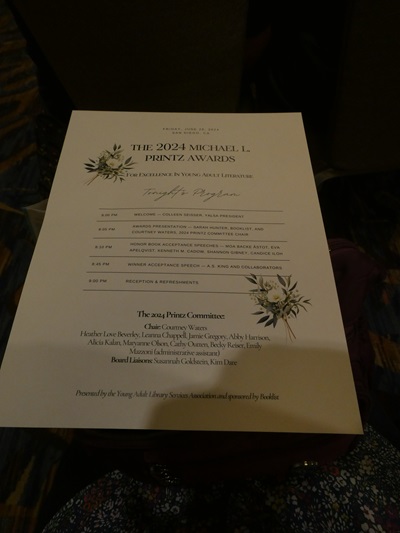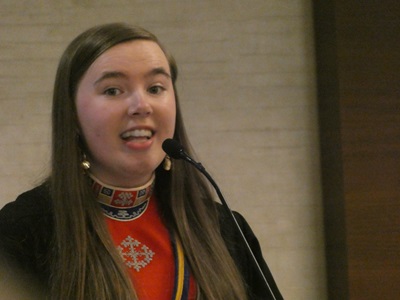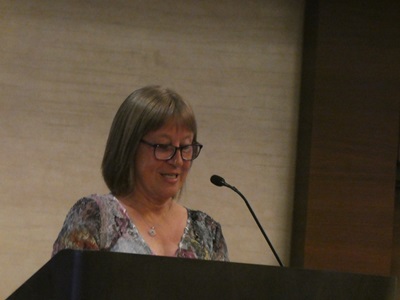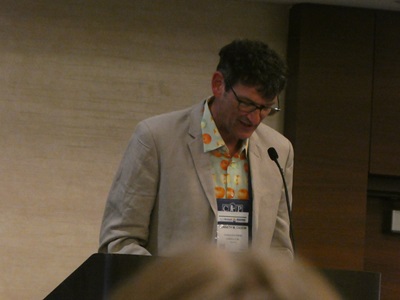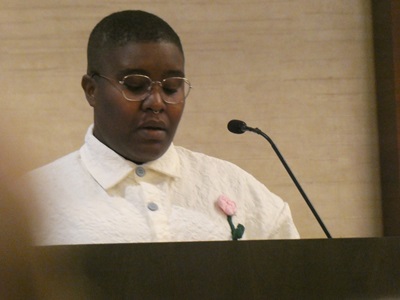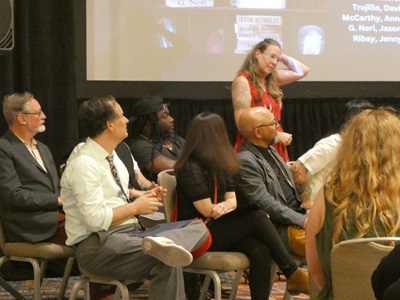The first big event of ALA Annual Conference is the Printz Awards and Reception on Friday night.
The ceremony was as exuberant and lovely as ever. I love that we get to hear from all the honorees, not the winner only.
My camera doesn’t do great in a big auditorium, but let me post some pictures and notes from the speeches:
First Honor Book Author was Moa Backe Astöt for Fire from the Sky
This award is beyond anything she imagined. She was 22 when the book was published, but was 15 when she started writing it. As a Sami teen, she didn’t see books about teens like her. She wanted to write a painful story with a happy ending. It’s crucial that indigenous people and minorities feel seen and represented in literature.
Next, her translator, Eva Apelqvist, spoke:
Sometimes we meet a book that we just want to share with the world. She first just translated a chapter to promote the book, and was so happy to get to translate more. The setting brings you to northern Sweden. She had to let go of cultural shackles and approach it with humility.
Next up was Kenneth M. Cadow, author of Gather:
A book with an award and a dog on the cover – and the dog lives!
He told a story of going to the solar eclipse – somehow we like to be reminded that we are small. People are unpredictable, sometimes pleasantly so. Our hope comes from knowing each other and tiptoeing around each other’s humanness. His book humannizes the data about white rural males and drugs.
Then came Shannon Gibney for The Girl I Am, Was, and Never Will Be:
She reaches out to other people on Planet Adoptee. Other adoptees see and recognize the experiences here. And non-adoptees have told her: We didn’t know.
Next up was Candice Iloh for Salt the Water:
Cerulean is someone she never had the chance to be at 17. She’d believed she had to follow what adults said she should do. Young people lose hope in the institutes they’re supposed to trust. What happens when our young people have had enough? She illuminated one Black queer child’s choice to seek safety. No one is safe until we all are.
Finally, they presented the Printz Medal for the short story collection, The Collectors, edited by A. S. King. All the authors went up front to the side, and A. S. King gave the speech.
She wanted the speech to be weird. (And succeeded!) She started off with a story of how she ended up recommending Slaughterhouse Five to an old guy – and then warning him it’s a weird book.
She thinks the word “weird” actually means “humane.” Which means that being humane is weird.
Teenagers live in an entirely different world than we did. There’s emotional currency in weirdness. It’s weird to tell the truth. Weird is humane. It wants you to tell the truth.
They remove humane books.
Not one career here tonight was self-made.
Protect trans kids for no other reason than it’s the right thing to do.
We work with battle-weary kids whose adults can’t see the war. We serve children because we’ve all been children.
The opposite of humane is Shame.
We are artists. We are art.
Some claim to protect children by removing their emotional fire extinguishers.
Be weird!
